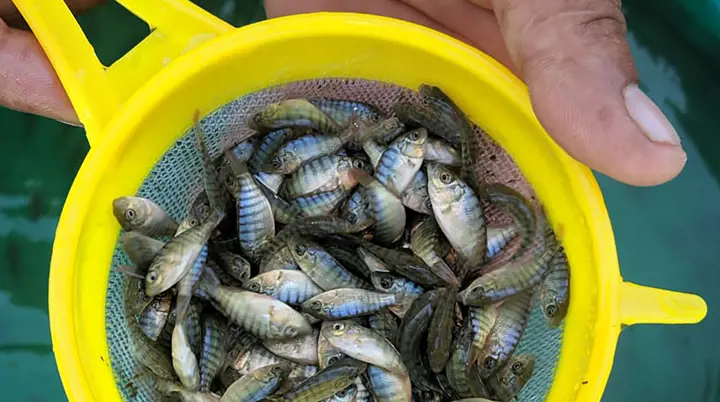The importance of early life nutrition for healthy fish development
Summary
Early life nutrition is vital for healthy fish development in aquaculture. During their initial weeks, species like Nile Tilapia grow rapidly, necessitating high nutrient intake. Providing broodstock with energy-rich feeds ensures quality eggs and successful larval transition. Optimizing feeding conditions and starter diets directly influence early developmental success, promoting faster growth and improved fish health from the start.
Did you know that most aquaculture species, such as Nile Tilapia (Oreochromis niloticus), may double in size every day during their first weeks of life? Indeed, fish go through intense morphological and physiological changes during their early life stages. They grow extremely quickly and, as a result, feed continuously. This means their total intake of nutrients needs to be high.

The Natural Power of the animal
The production of fast-growing and healthy fish larvae and fry can only be achieved under optimum conditions. The first step is to provide the broodstock fish with high-quality, energy-rich feeds. This is vital for the production of high-quality eggs and the successful transition of larvae, fulfilling their nutrient requirements from the yolk-sac to the first feeding with formulated feeds.
Stimulating high nutrient intake with high-quality feeds during the first weeks of life is key to healthy lifetime performance. Starter feed should be easily digestible with a consistent composition. In the first instance, it should provide the key nutrients required for optimal growth, including fatty acids, peptides, amino acids, vitamins and minerals. At the same time, the feed should boost a range of functionalities in order to provide additional benefits. These include modulating muscle growth, boosting immunity, stimulating gut development, regulating the gut microbiome and improving the antioxidative status of fish larvae.
Fish fry or fingerlings are especially sensitive to dietary nutrient deficiencies. Imbalances in certain nutrients can result in skeletal anomalies during the development of fish larvae, as well as diseases of the gills, immune-system deficiencies and low digestive enzyme production. These kinds of complications can lead to lower growth rates and increased mortality, and they can significantly affect animal welfare. From an economic perspective, issues such as skeletal deformities will also impact the market value of the fish.
Early-stage feeding
Studies on larval growth and fish survival show that optimising feeding conditions, together with feeding frequency and the physical quality of starter diets, directly influences the success of the early developmental stages.
For example, tilapia fry can be produced semi-intensively, and zooplankton can provide nutrients in addition to the complete, formulated feed. This creates the flexibility needed to fulfil the different nutritional requirements of the feed itself. However, when zooplankton availability declines, due to more intensive production or tank production, the feed must provide all of the different nutrients required for optimal growth.
Frequent feedings of more than 4 meals a day are necessary to ensure higher nutrient intake and ensure fast growth, as well as the survival of the fish.
The physical characteristics of feed are also critical during the early-life phase, and the size of pellets or crumbles should be aligned with the growth rates of the fish. For example, start by using slow-sinking feed, which supports the natural behaviour of the initial feeding that takes place in the water column. You can then optimise your feeding strategy by switching from slow-sinking to floating micro-pellets with good water stability,
In summary, ensuring appropriate feeding strategies and optimising the physical quality of starter diets will help to improve feed intake and reduce fish size variation. This will result in fish growing faster and enjoying healthy development from the start.
A hands-on, targeted approach
Our hands-on Natural Power programme brings together all these insights and more to help you improve animal health and optimise animal performance on your farm while supporting the prudent use of antibiotics.
Learn more about the Natural Power programmeAbout the author
Julia Maz Munoz
Global Aqua Nutrition & Product manager


